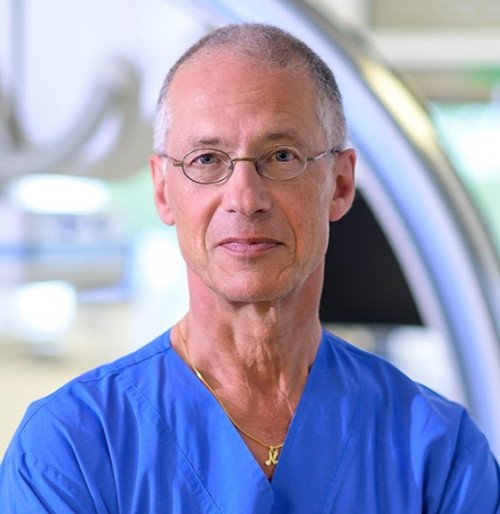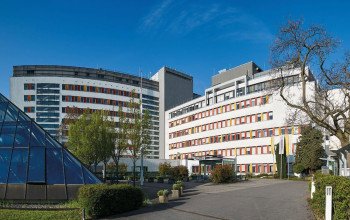
Rating : 10/10 (⭐⭐⭐⭐⭐)
🔹Prof. Dr. med. Horst Sievert, cardiologist and angiologist, founded the CVC in 2003. He is a Professor of Internal Medicine/Cardiology at the University of Frankfurt and an Honorary Professor at several foreign universities.
🔹Prof. Sievert studied at the universities of Mainz and Frankfurt. After further training in Internal Medicine, Nephrology, Intensive Care Medicine, and Radiology, he specialized in Cardiology and Angiology. In 1990, he became head of the Department of Interventional Cardiology and Angiology at the Cardiovascular Center in Rotenburg. In 1993, he moved to Bethanien Hospital in Frankfurt, where he co-founded the CCB with colleagues from the Cardio-Angiological Practice Group on Böttgerstrasse. From 2007 to 2009, alongside his work in Frankfurt, he served as Director of the Catheter Laboratory for Peripheral Vessels and Structural Heart Diseases at the Washington Hospital Center in Washington, USA.
🔹He has led many scientific studies and authored more than 400 publications (https://pubmed.ncbi.nlm.nih.gov/) and over 1,000 abstracts in journals, books, and book contributions. He has also given more than 3,000 lectures worldwide and organized more than 300 workshops, congresses, and conferences. He is a member of the editorial boards of several medical journals.
🔹Prof. Sievert has personally performed over 60,000 cardiovascular catheter interventions. In addition to coronary and peripheral procedures, his work in the catheter laboratory focuses on highly specialized procedures for patients with structural, valvular, and congenital heart diseases. Prof. Sievert was the first in the world to perform atrial appendage closure (a procedure for stroke prevention) and one of the first to conduct many other procedures, including PFO closure, valvuloplasty, ductus arteriosus closure, TAVI, transcatheter mitral and tricuspid valve repair, coarctation angioplasty, paravalvular leak closure, catheter therapy of left ventricular aneurysms, aortic aneurysm endoprosthesis implantation, acute stroke interventions, and many others. He has one of the largest global experiences in catheter treatment of heart defects in adults and receives referrals from all over the world. He has received numerous awards, including the Bleifeld Memorial Award, the PICS & AICS Lifetime Achievement Award, the ICI Lifetime Achievement Award, and the TCT Master Operator Award.
🔹Prof. Sievert primarily works in the catheter laboratory. He consults (in person or by phone) and treats both private and public health insurance patients.
🔹Additional qualifications: Interventional Cardiology, Interventional Therapy of Arterial Vascular Diseases, Special Rhythmology, Heart Failure (DGK), and ACHD (DGPK), Expertise in Genetics.
Personal Information:
🔹Date of Birth: December 24, 1954
🔹Place of Birth: Ibbenbüren, North Rhine-Westphalia, Germany
Education:
🔹1973: Abitur, Wöhler-Gymnasium, Frankfurt am Main
🔹1973–1979: Studied Medicine at the Universities of Mainz and Frankfurt
🔹1979: Completed medical state examination as top of his class
🔹1979: Received medical licensure (Approbation)
🔹1980: Doctorate in Angiology (Magna cum laude) under Professor Breddin
Postgraduate Training:
🔹1980–1987: Internal Medicine, Nephrology, and Intensive Care Medicine training at Stadtkrankenhaus Offenbach under Professor Schäfer
🔹1987: Certified in Internal Medicine
🔹1988: Subspecialty in Cardiology at the University Hospital Frankfurt under Professor Kaltenbach1996: Subspecialty in Angiology
🔹1997: Additional qualification in Intensive Care Medicine
Habilitation:
🔹1990: Habilitation in Interventional Cardiology
Professional Career:
🔹1990–1993: Chief Physician of Cardiology, Heart and Circulatory Center, Rotenburg
🔹Built and led one of the largest interventional cardiology departments in Germany
🔹1993–Present: Head of the Department of Cardiology at Bethanien Hospital, Frankfurt
🔹2003–Present: Director of the CardioVascular Center (CVC) at St. Katharinen Hospital, Frankfurt
🔹2007–2009: Head of the Catheter Laboratory for Peripheral Vessels and Structural Heart Diseases, Washington Hospital Center, USA
Academic Roles:
🔹1998: Appointed as Adjunct Professor
Areas of Expertise:
🔹Interventional Cardiology
🔹Interventional Angiology
Cardiology Procedures:
🔹 Chronic Total Occlusion CTO treatment in Germany
🔹Coronary Angioplasty (Balloon Angioplasty): A procedure to open narrowed or blocked coronary arteries treatment in Germany.
🔹Stent Placement: Inserting a stent to keep arteries open after angioplasty.
🔹Coronary Artery Bypass Grafting in Germany (CABG): Surgery to bypass blocked coronary arteries using grafts from other blood vessels.
🔹Transcatheter Aortic Valve Replacement (TAVR): A minimally invasive procedure to replace a narrowed aortic valve.
🔹Mitral Valve Repair/Replacement: Surgical or percutaneous methods to fix or replace a damaged mitral valve.
🔹Percutaneous Coronary Intervention (PCI): Non-surgical method to treat narrowing of the coronary arteries.
🔹Atrial Septal Defect (ASD) Closure: Procedure to close a hole in the heart's septum between the atria.
🔹Patent Foramen Ovale (PFO) Closure: Closing a small hole between the heart's atria that didn't close at birth.
🔹Electrophysiological Studies (EPS): Testing to assess the electrical activity of the heart.
🔹Ablation Therapy: A procedure to destroy areas of the heart causing abnormal electrical signals, often used for arrhythmias.
🔹Cardiac Catheterization: A diagnostic procedure to assess heart function and measure pressures within the heart.
🔹Heart Transplantation: Surgical replacement of a failing heart with a healthy donor heart.
🔹Left Ventricular Assist Device (LVAD) Placement: A mechanical pump implanted to assist heart function in patients with severe heart failure.
🔹Implantable Cardioverter Defibrillator (ICD) Placement: Device implanted to monitor and treat life-threatening arrhythmias.
Angiology Procedures:
🔹Endovenous Laser Treatment (EVLT): A minimally invasive procedure to treat varicose veins using laser energy.
🔹Sclerotherapy: Injection of a solution to eliminate small varicose veins and spider veins.
🔹Peripheral Angioplasty: Similar to coronary angioplasty but for peripheral arteries, such as those in the legs.
🔹Stenting of Peripheral Arteries: Placement of stents in peripheral arteries to keep them open.
🔹Aneurysm Repair: Surgical or endovascular repair of aneurysms, including abdominal aortic aneurysms.
🔹Fistula Creation for Dialysis: Surgical creation of an access point for patients requiring dialysis.
🔹Thrombectomy: Surgical removal of a blood clot from a blood vessel.
🔹Carotid Endarterectomy: Surgery to remove plaque from the carotid artery to prevent stroke.
🔹Angiography: Imaging test to visualize blood vessels using a contrast dye.
🔹Transluminal Angioplasty: A procedure to widen narrowed blood vessels using a balloon.
Other Procedures:
🔹Holter Monitoring: Continuous monitoring of heart rhythms for 24-48 hours.
🔹Stress Testing: Assessing heart function under stress, often using exercise or medications.
🔹Echocardiography: Ultrasound imaging of the heart to assess function and structure.
🔹Cardiac MRI/CT Imaging: Advanced imaging techniques for detailed assessment of heart conditions.


.webp)
 (1).webp)

.webp)
 (1).webp)


.webp)
 (1).webp)

.webp)
 (1).webp)
